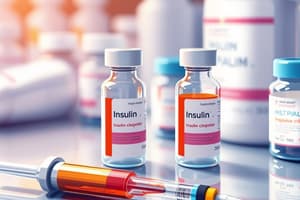Podcast
Questions and Answers
Which type of insulin has the fastest onset of action?
Which type of insulin has the fastest onset of action?
- Long-acting insulin
- Rapid-acting insulin (correct)
- Regular insulin
- Intermediate-acting insulin
What is the primary use of meglitinide drugs?
What is the primary use of meglitinide drugs?
- To treat hypertension in diabetic patients
- To control fasting blood sugar levels
- To manage variable meal schedules (correct)
- As a first-line therapy for diabetes
Which side effect is commonly associated with sulfonylurea drugs?
Which side effect is commonly associated with sulfonylurea drugs?
- Weight gain
- Insulin resistance
- Lactic acidosis
- Hypoglycemic reactions (correct)
Which insulin preparation has a duration of action of more than 24 hours?
Which insulin preparation has a duration of action of more than 24 hours?
What is the main function of metformin in diabetes management?
What is the main function of metformin in diabetes management?
What distinguishes the first-generation sulfonylureas from second-generation agents?
What distinguishes the first-generation sulfonylureas from second-generation agents?
Which adverse effect is associated with the use of phenformin, a biguanide?
Which adverse effect is associated with the use of phenformin, a biguanide?
Which class of antidiabetic agents is known to work as an insulin sensitizer?
Which class of antidiabetic agents is known to work as an insulin sensitizer?
What is a potential adverse effect of rosiglitazone?
What is a potential adverse effect of rosiglitazone?
Which of the following is NOT a recommended use for SGLT-2 inhibitors?
Which of the following is NOT a recommended use for SGLT-2 inhibitors?
What is a common adverse effect of alpha-glucosidase inhibitors like acarbose?
What is a common adverse effect of alpha-glucosidase inhibitors like acarbose?
Which of the following GLP-1 receptor agonists is administered as a sustained-release preparation for weekly injections?
Which of the following GLP-1 receptor agonists is administered as a sustained-release preparation for weekly injections?
What is one of the main reasons GLP-1 itself is not used therapeutically?
What is one of the main reasons GLP-1 itself is not used therapeutically?
Flashcards
Thiazolidinediones (TZDs)
Thiazolidinediones (TZDs)
A class of drugs used to treat type 2 diabetes by increasing insulin sensitivity.
Edema
Edema
A common side effect of TZDs that can lead to fluid retention and swelling.
DPP-4 Inhibitors
DPP-4 Inhibitors
A class of drugs that inhibit the breakdown of GLP-1, a hormone that stimulates insulin release.
Liraglutide
Liraglutide
Signup and view all the flashcards
SGLT-2 Inhibitors
SGLT-2 Inhibitors
Signup and view all the flashcards
Types of Insulin Preparations
Types of Insulin Preparations
Signup and view all the flashcards
Rapid-Acting Insulin
Rapid-Acting Insulin
Signup and view all the flashcards
Short-Acting Insulin
Short-Acting Insulin
Signup and view all the flashcards
Intermediate-Acting Insulin
Intermediate-Acting Insulin
Signup and view all the flashcards
Long-Acting Insulin
Long-Acting Insulin
Signup and view all the flashcards
Sulfonylurea Drugs
Sulfonylurea Drugs
Signup and view all the flashcards
Meglitinide Drugs
Meglitinide Drugs
Signup and view all the flashcards
Metformin (Biguanide)
Metformin (Biguanide)
Signup and view all the flashcards
Study Notes
Insulin Preparations
- Insulin preparations are categorized as short-acting, rapid-acting, intermediate-acting, and long-acting.
- Rapid-acting insulins:
- Insulin aspart: onset 10-20 minutes, peak 40-50 minutes, duration 3-5 hours
- Insulin lispro: onset 15-30 minutes, peak 30-90 minutes, duration 3-5 hours
- Insulin glulisine: onset 20-30 minutes, peak 30-90 minutes, duration 1-2.5 hours
- Short-acting insulin:
- Regular insulin: onset 30-60 minutes, peak 2-5 hours, duration 5-8 hours
- Intermediate-acting insulin:
- Isophane (NPH) insulin: onset 1-2 hours, peak 4-12 hours, duration 18-24 hours
- Long-acting insulins:
- Insulin glargine: onset 1-1.5 hours, no peak, duration 20-24 hours
- Insulin detemir: onset 1-2 hours, peak 6-8 hours, duration up to 24 hours
- Insulin degludec: onset 1-2 hours, no peak, duration >24 hours
Other Antidiabetic Agents
- Sulfonylureas:
- First oral antidiabetic agents.
- Original sulfonylureas include chlorpropamide, acetohexamide, and tolbutamide.
- Second-generation drugs include glimepiride, glipizide, and glyburide.
- Meglitinides:
- Examples are repaglinide and nateglinide.
- Useful for patients with variable meal schedules.
- Hypoglycemic reactions are less severe than with sulfonylureas.
- Biguanides:
- Metformin is an antihyperglycemic biguanide.
- Phenformin was removed from the market due to an unacceptable risk of lactic acidosis.
- Used alone or combined with other antidiabetic medications.
- Thiazolidinediones (Insulin sensitizers):
- Examples are pioglitazone and rosiglitazone.
- Used to manage type 2 diabetes as an adjunct to diet and exercise.
- Adverse effects include edema, increased plasma volume, increased risk of heart failure, and increased risk of myocardial infarction (MI), particularly with rosiglitazone.
Other Antidiabetic Agents Details
- alpha-Glucosidase Inhibitors: Acarbose and Miglitol. Adverse effects include increased flatulence and bloating.
- GLP-1 Receptor Agonists (GLP-1RAs) and DPP-4 Inhibitors: GLP-1 itself is not useful due to quick degradation. Exenatide is now available in a sustained-release formulation for weekly injection. Other medications include Liraglutide, Sitagliptin, Linagliptin, and Saxagliptin.
- Amylin Analogue: Pramlintide acetate reduces caloric intake and may lead to weight loss. Administered Subcutaneously.
- SGLT-2 Inhibitors: Canagliflozin, empagliflozin, and dapagliflozin. Adverse effects include urinary tract infections.
Studying That Suits You
Use AI to generate personalized quizzes and flashcards to suit your learning preferences.




